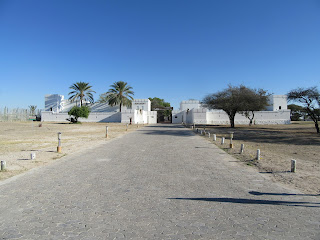Thursday my friend Kate, who was in Peace Corps
Thailand with me, arrived for a brief visit. Wilhelmina drove me to the airport
to meet her at noon. Then we went to a rather fancy restaurant at a guest lodge
for lunch.
Next we stopped at the open market so Kate could see the traditional
foods and clothes as well as other items sold there. Wilhelmina chatted with a
Herero woman who was selling traditional medicine. One was elephant dung. You
burn the dung, cover your head with a towel, and breathe in the smoke to cure a
headache. When Kate mentioned this to our guide, he said he does this. Sometimes
he collects elephant dung when he finds it along the road in the park. The
woman let me take a photo for N$5/ $0.33, which is standard for Herero women.
Then it was time to return to Ompundja. Kate was
greeted very warmly by Kowmongwa and Helena. He wanted photos of her with them
and of me with them while we were taking photos. Kate was not fond of the long
drop toilet. We had a brief visit to the school and then walked around the
block, stopping at the local shops on the way back. It was fun to share my home
with her and to see her reactions to it. We had a good catching up chat since
we hadn’t communicated for six years.
Friday morning we went to school where she was
greeted warmly by the teachers and curiously by the learners. She was the
lesson of the day for my classes and was a big hit. She had brought photos of
her life in Montana. After talking about them briefly with the learners
gathered around so they could see the photos, we had them form groups so they
could inspect the photos closely and ask questions. Each group was given a
small number of photos, and Kate exchanged them periodically. They really got
into examining the photos and many asked questions and talked to her as well as
to me. It was a great lesson all morning.
At noon, we embarked on our safari to Etosha
National Park. We had hired Morne, a local tourism agent, to drive and guide
us. He was great—very knowledgeable and friendly. Sometimes a bit too chatty
for me, as I like quiet sometimes, but it was good to have him taking care of
us and he was enjoyable and enthusiastic.
On the way into the park, we saw blue wildebeests
and Burchell’s zebras that had somehow escaped from the park’s boundaries. These
zebras have curved lines rather than straight ones that the mountain zebras
have. Their faces have an intricate striped diamond.
The plan for the afternoon was to drive to our
lodge, stopping at all the waterholes on the way. I had read that, since this
is the dry season, there was a good chance of seeing many animals at
waterholes. At the first waterhole close to the park entrance, there was an
elephant drinking water. Some zebras were nearby waiting for their turn, but
they wouldn’t go to the waterhole while the elephant was there. Except one brave
one that was drinking at the far end; the elephant ignored it when it passed when
leaving the waterhole.
Later we watched another elephant at a waterhole
while a group of kudu and some elands and gemsboks/oryx waited for their turn.
They would approach the waterhole and then back off. Finally one eland had a drink, and the elephant ignored it. When the elephant left, the other animals retreated to the trees without drinking. Maybe they returned later.
The road was long, flat, mostly straight and
dusty. As we drove, we saw a good variety of other animals:
ostriches,
warthogs,
springboks,
gemsboks/oryx,
elands,
giraffes. It was
quite an exciting start to our three days in Etosha.
Other highlights of the day:
A line of elephants walking to a waterhole
An elephant walking along a path towards us and
then crossing the road in front of us
Our lodging Friday night was at Namutoni Rest
Camp, which was originally a German fort. We arrived just before 5:30 when the
gate is closed for the night.
As at all three guesthouses in the park, there is
a waterhole that is lit at night so people can see the animals that come. However,
none were there when we sat for a while before dinner. From our room it was a
three-minute walk to the waterhole; so I returned after dinner and before going
to sleep. And I woke up twice during the night and walked to the waterhole to
check, but nothing was there at any of these times, which was disappointing but
OK.
In the morning, there were a bunch of guinea fowl
that looked like small rocks on the far side of the waterhole.








































